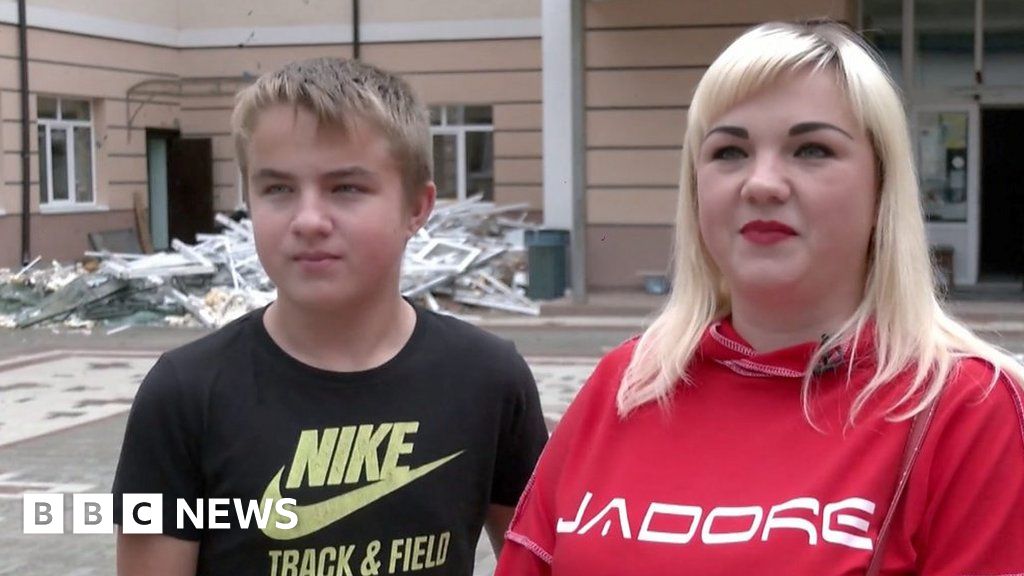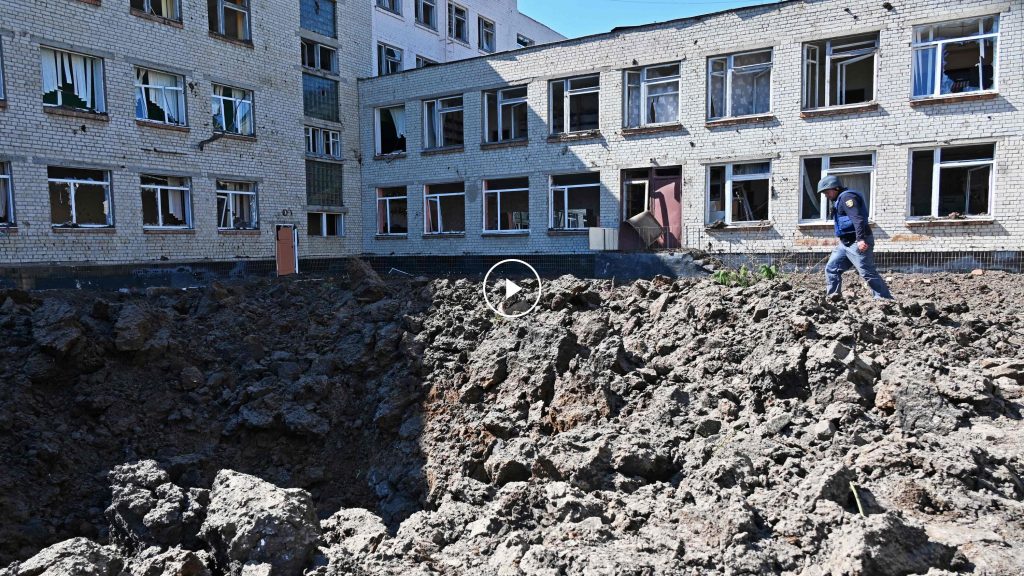In a harrowing incident that has sent shockwaves across the globe, Russian forces bombed a kindergarten in Kharkiv, Ukraine, during a massive drone and missile attack. The attack, which occurred overnight, left one person dead and seven injured, with all children safely evacuated to shelters. The event underscores the ongoing brutality of the conflict and raises urgent questions about the targeting of civilian infrastructure.
This article delves into the details of the attack, its implications, and the broader context of Russia’s military actions in Ukraine. We will explore how this incident fits into the larger narrative of the war, examine the impact on Ukrainian civilians, and discuss the international response.
The Attack on the Kindergarten
On April 21, 2025, Russian forces launched a devastating attack on a kindergarten in Kharkiv, one of Ukraine’s largest cities. The attack was part of a broader assault that saw over 400 drones and 28 missiles fired at various targets across the country. The kindergarten, which serves as a vital community center for young children, was hit, causing significant damage and trauma to those present.
The attack resulted in one fatality and seven injuries, including several children who were evacuated to safety. According to Ukrainian authorities, many of the affected individuals are experiencing acute stress reactions, highlighting the psychological toll of such attacks on vulnerable populations.
President Volodymyr Zelensky announced the incident, emphasizing the need for increased international support to protect Ukrainian civilians from further harm. The attack has sparked outrage both within Ukraine and internationally, with many calling for stronger measures to hold Russia accountable for its actions.
The Broader Context of the Conflict

The bombing of the kindergarten is not an isolated incident but part of a pattern of attacks targeting civilian infrastructure in Ukraine. Since Russia’s full-scale invasion began in February 2022, the country has faced relentless bombardments that have destroyed homes, schools, and hospitals.
According to data from Ukraine’s Deputy Minister of Education, more than 3,500 educational facilities have been struck by Russian forces, with one out of every seven schools destroyed. These attacks have disrupted the education of millions of Ukrainian children, forcing many to rely on remote learning or makeshift classrooms.
The destruction of schools and other civilian infrastructure is a deliberate strategy aimed at demoralizing the population and undermining the country’s cultural identity. By targeting educational institutions, Russian forces seek to erode the foundation of Ukrainian society and weaken the resolve of its people.
The Impact on Ukrainian Civilians

The attack on the kindergarten has had a profound impact on the local community. Parents and educators are deeply concerned about the safety of their children and the long-term effects of such violence on their mental health.
In the aftermath of the attack, many families have expressed fear and anxiety, with some considering leaving their homes to seek refuge elsewhere. The trauma of witnessing such an attack on a place meant to be safe for children is particularly devastating.
Ukrainian officials have called for increased international support to provide psychological care and resources for those affected by the attacks. They emphasize that the well-being of children should be a top priority in any efforts to address the conflict.
International Response and Calls for Action

The bombing of the kindergarten has drawn condemnation from the international community. Leaders from the United States, European Union, and other countries have voiced their concern and urged Russia to cease its attacks on civilian targets.
U.S. President Joe Biden has reiterated his commitment to supporting Ukraine, emphasizing the importance of providing military aid and strengthening alliances to counter Russian aggression. The White House has also called for increased pressure on Moscow to end the war and respect international law.
European leaders have echoed these sentiments, with many calling for stronger sanctions against Russia and greater coordination among NATO allies to support Ukraine. The European Union has also pledged additional financial assistance to help rebuild the country’s infrastructure and support its citizens.
The Role of Media and Public Awareness

The media plays a crucial role in bringing attention to the plight of Ukrainian civilians and the ongoing conflict. Journalists and news outlets have provided critical coverage of the bombing, shedding light on the human cost of the war and the resilience of the Ukrainian people.
Social media platforms have also been instrumental in amplifying the voices of those affected by the attacks. Hashtags such as #StopRussia and #UkraineStrong have gained traction, encouraging global solidarity and support for Ukraine.
However, the spread of misinformation and propaganda remains a challenge. Russian state media has attempted to downplay the scale of the attacks and shift blame onto Ukrainian authorities. It is essential for the public to rely on credible sources and fact-check information before forming opinions.
The Path Forward
As the conflict continues, the international community must remain vigilant and committed to supporting Ukraine. This includes not only military aid but also humanitarian assistance, diplomatic efforts, and long-term solutions to ensure peace and stability in the region.
Efforts to negotiate a peaceful resolution to the conflict are ongoing, with various proposals being discussed. However, progress has been slow, and the situation remains volatile. The international community must continue to apply pressure on Russia to engage in meaningful dialogue and respect the sovereignty of Ukraine.
At the same time, it is crucial to prioritize the protection of civilian infrastructure and the well-being of Ukrainian citizens. This includes implementing stricter measures to prevent attacks on schools, hospitals, and other essential services.
Conclusion
The bombing of the kindergarten in Kharkiv is a tragic reminder of the human cost of the conflict in Ukraine. It highlights the need for continued international support, increased pressure on Russia, and a renewed focus on protecting civilian lives.
As the world watches the unfolding events, it is clear that the fight for Ukraine’s future is far from over. The resilience of the Ukrainian people, their determination to preserve their culture and identity, and the global solidarity they have received offer hope for a brighter future.
Stay updated with the latest news and continue to support efforts to bring peace to Ukraine.
Author Section
Author: [Name]
Title/Role: Senior Correspondent
Credentials: With over a decade of experience covering international conflicts and political developments, [Name] has reported from conflict zones across the globe, providing in-depth analysis and insightful commentary on current events.
Profile Link: [Link to author profile]
Sources
Related Articles
- How Ukraine is Rebuilding Its Education System
- International Sanctions Against Russia
- The Human Cost of the Ukraine War
Call to Action
Stay informed and take action to support Ukraine. Visit our website to learn more about how you can contribute to relief efforts and advocate for peace in the region.











More Stories
US Trending News: The ‘Your Mom’ White House: A Trendy Take on Political Humor
US Trending News: Who Is Karoline Leavitt, ‘Your Mom’ in Political Memes?
How Will VA Compensation Be Affected by a Government Shutdown?